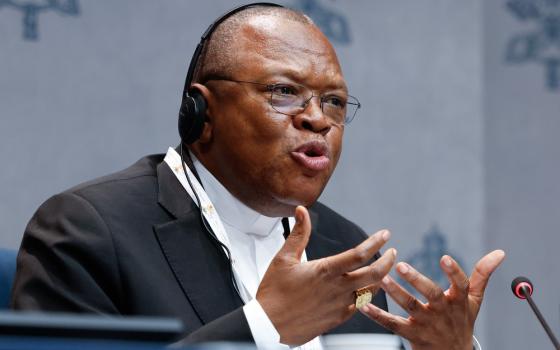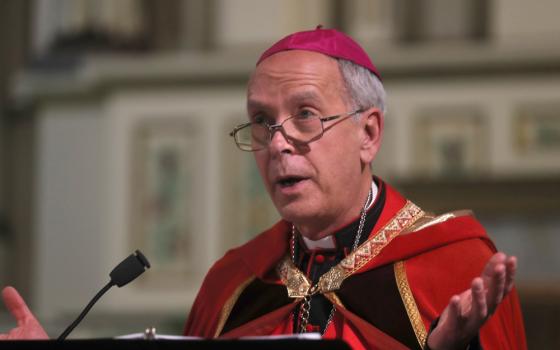ROME -- When you’re talking about the Vatican, it’s a good idea to be careful about using the word “unprecedented.” Over hundreds of years of history, almost everything has happened at least once.
This afternoon, however, brought something you definitely don’t see every day: A prominent Muslim woman standing in the heart of Rome, opining that Europe needs to become “more confident in its Christianity.”
Baroness Sayeeda Warsi, a cabinet minister in the U.K. and the highest-ranking Muslim woman in the West, made that case before present and future Vatican diplomats at the Pontifical Ecclesiastical Academy in Rome. She spoke as part of a high-level delegation of U.K. officials in town for working meetings with Vatican officials.
Pope Benedict XVI, whom Warsi will meet tomorrow, previously has proposed a grand “Alliance of Civilizations” with Islam, one thrust of which is that Christians and Muslims should be natural allies against radical currents of secularism seeking to exclude religion from public life.
Today’s speech amounted to a signal that at least one influential British Muslim, and a woman to boot, is ready to sign on.
It’s not the first time Warsi has come out swinging against what she calls a “suspicion of faith” in Europe.
Back in 2010, just ahead of Pope Benedict XVI’s high-profile visit to the United Kingdom, she announced in a speech to Anglican bishops that the new conservative government under David Cameron would “do God”. That was a reference to a famous quip by an advisor to Tony Blair suggesting that “God,” in the sense of overt references to religion, is precisely what enlightened European pols don’t do.
Today, however, marked the first time Warsi has brought her religion-friendly message to the pope’s backyard.
“In order to ensure faith has a proper space in the public sphere, in order to encourage social harmony, people need to feel stronger in their religious identities, more confident in their beliefs,” she said. “In practice this means individuals not diluting their faith, and nations not denying their religious heritage.”
“If you take this thought to its conclusion then the idea you’re left with is this: Europe needs to become more confident in its Christianity,” Warsi said.
Warsi, the daughter of Pakistani immigrants to the U.K., said that as a child whatever discrimination she faced was based on race, but after 9/11 the focus shifted to religion. That experience, she said, has led her to oppose anti-religious discrimination wherever she finds it – against Muslims, but also, she said, slights to Europe’s Christian heritage.
Though Warsi has drawn fire from some Muslim leaders and groups, particularly for supporting Western incursions in Afghanistan and other Muslim nations, she’s also taken up popular Muslim causes in the West, including opposition to public bans on head scarves and burqas.
In her speech this afternoon, Warsi endorsed inter-faith dialogue, but not a lowest-common-denominator exercise in which differences are played down.
“Just as Esperanto, which attempted to build a new tongue and neutralizes our component languages, a common language between faiths risks watering down the diversity and intensity of our respective religions,” she said.
“It’s not about us coming to some watered-down compromise,” Warsi said, “but being firm enough in our devotion to work together.”
Warsi argued that when a Christian fights anti-Semitism, or when a Muslim defends the Sikhs, it’s not a sign of weakness in their faith, but of strength.
Warsi identified two primary categories of opponents of a robust public role for religion in today’s Europe.
First, she said, is the “well-intentioned liberal elite,” figures “who think that the route to religious pluralism is by creating a path of faith-neutrality.” In fact, she said, their version of a level playing field is “all but impassable to anyone of belief.”
Second, she said, are “anti-religionists” and “faith deniers”, meaning people who seek “to remove all trace of religion from culture, history and public discourse.” What they miss, she said, is that “people of faith give more to charity, and the number of people going to a place of worship is globally on the up.”
Militant forms of secularism, Warsi said, are reminiscent of the totalitarian ideologies of the 20th century in their intolerance for religious belief.
She laid out her version of an antidote:
- Holding firm in our faiths.
- Holding back intolerance.
- Reaffirming the religious foundations on which our societies are built...
- Reasserting the fact that, for centuries, Christianity in Europe has been inspiring, motivating, strengthening and improving our societies.
tNone of that implies, Warsi said, uncritical deference to religious voices. She noted that at the moment, Anglican bishops in the U.K. are opposing a set of welfare reforms floated by the Cameron government. She recognizes their right to be heard, she said, while also reserving the right to think they’re wrong.
Tomorrow, Warsi and the other members of the U.K. delegation will meet Benedict XVI in a Vatican audience. It’s hard to imagine she won’t find common ground with the pope on her concluding note in tonight’s speech:
“People need to realize that, in our continent and beyond, Christianity’s teachings and value are as permanent as Westminster Abbey, as indelible as Da Vinci’s Last Supper, and as solid as Christ the Redeemer,” she said.
“Christianity is as vital to our future as it is to our past,” Warsi said.


